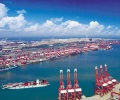

The closure of a critical container terminal at the Port of Ningbo in China because of a COVID infection is having swift ripple effects that are likely to spread worldwide, adding to shipping delays and stretching order lead times as companies try to stock shelves for the holiday shopping season.
As of 4 p.m. Friday, local time, 40 vessels were waiting at anchor for a berth outside Ningbo, and an additional 30 container ships were parked outside the Port of Shanghai, according to Kuehne + Nagel’s SeaExplorer platform.
The average wait time for a berth is two to three days, said Franziska Bietke, global sea logistics marketing manager for K + N, the largest ocean freight forwarder by volume in the world.
Port officials suspended operations at Ningbo’s Meishan Terminal early Wednesday after a single worker tested positive for COVID. All inbound and outbound container operations at the facility have been redirected to other terminals until further notice, adding to congestion at those locations. Meishan is one of five container terminals in Ningbo and handles about a quarter of the port’s total volume. Authorities say trucking, container yard and dockside activity will remain on hold until the Ningbo Municipal Health Commission can determine the extent of the outbreak.
In two days the average number of weekly port calls to Ningbo has plunged 70% from nearly 200 container vessels to fewer than 60 this week as ocean carriers divert vessels and initiate blanked sailings to and from the port, according to data provided by project44, a supply chain visibility platform.
The Chicago-based data company said it has recorded 37 blanked sailings as of Friday, meaning carriers are skipping Ningbo to maintain schedule integrity on their routes.
Chinese authorities are clamping down hard to snuff out new COVID-19 outbreaks as the infection rate hits its highest level since last year, although numbers are much lower by comparison than in western nations. Chinese airports are also implementing labor restrictions to prevent the spread of COVID, which is reducing manpower available to load and unload cargo aircraft, especially in Shanghai. Airlines are canceling flights because the delays are jeopardizing short turnaround windows, and Chinese carriers are scrapping many flights because of quarantines that are creating pilot shortages.
This is the second time this year a major port terminal in China has been shuttered for COVID precautions. The Yantian International Container Terminal in Shenzhen was restricted to 30% productivity for a month from late May through June because of coronavirus infections, causing huge container backlogs and congestion at other ports that tried to pick up the slack. The pent-up arrival of containers subsequently created cargo jams at destination ports in the U.S. and Europe.
Ningbo is the third-largest container port in the world.
According to K + N data, there are 330 container vessels worldwide idle outside ports because of congestion.
Ocean carriers on major trade lanes have been overbooked all year, forcing shippers to wait for weeks to get their container on a vessel and driving shipping rates through the roof. It now costs nearly 10 times more to move a box from Asia to the U.S. West Coast than it did before the pandemic.
COVID effects on manufacturing
In related news, Honda Motor Co. announced Aug. 4 the indefinite suspension of all three of its joint-venture assembly plants, with a combined annual capacity of 720,000 vehicles in Wuhan after many factory workers were unable to commute to work due to lockdowns in the region. It is the second time the automaker has stopped production in Wuhan.
Additionally, a number of Taiwanese companies, including industrial paper producer Yongfengyu Zaozhi, have halted operations in Yangzhou for at least a week due to a COVID-19 outbreak in the city of Yangzhou and subsequent stay-at-home orders, according to a report from Everstream Analytics, a provider of supply chain risk analytics.
Several chemical companies in Jiangsu province have reported disruptions in transportation, which is negatively impacting operational capabilities, it said. Transportation capacity in Nanjing and Taizhou has reportedly been reduced by one-third due to COVID-19 testing requirements, with drivers reluctant to go to areas with medium or high risks. If restrictions continue, labor shortages may become acute and lead to further production halts, Everstream warned.
Source: Freight Waves